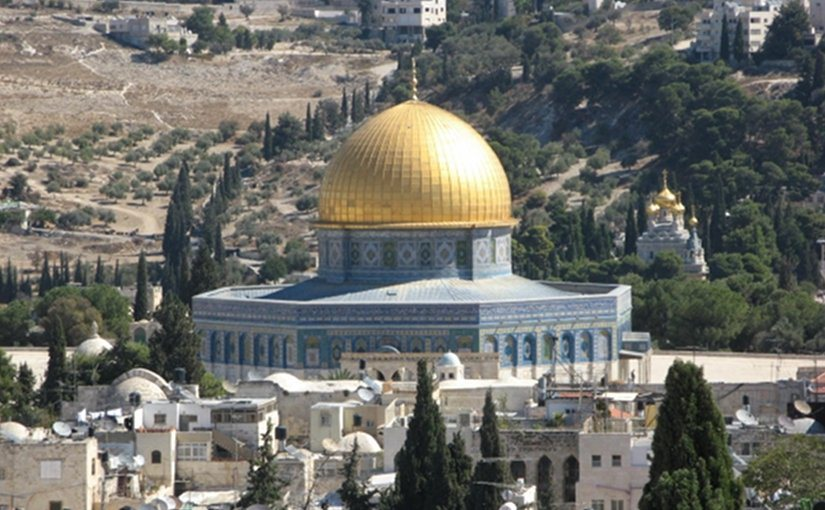By: David Rosenberg
“It’s a cheap way to raise the flag. There is lot of jockeying for position right now, like threatening to close the Strait of Hormuz.
WHEN the Arab League foreign ministers hold on an emergency meeting this Thursday, three items are slated to top their agenda – the crisis in Syria, the threat of war in Sudan and three rock outcroppings in the Gulf.
The tiny islands Abu Musa and the Greater and Lesser Tunbs have been in dispute for more than four decades. But a visit to Abu Musa by Iranian President Mahmoud Ahmadinejad on April 11 has ratcheted up tensions over them at a time when the region is already on edge over the nuclear standoff between Tehran and the West and over the revolution in Syria.
“No one wants a new foreign policy issue to erupt at this junction, but that is exactly what is happening. And, this time it may stick because of the timing,” Theodore Karasik, director for research and development at the Institute for Near East and Gulf Military Analysis, told The Media Line. “It’s a whole new level of rhetoric.”
Iran and its Arab Gulf neighbors have a long and growing list of mutual grievances. The Arabs accuse Tehran of developing nuclear weapons as a way of establishing hegemony over the region and of provoking unrest among their minority Shiite populations. Iran resents its Arab neighbors for aligning with the US and for siding with the rebels seeking to bring down Syrian President Bashar Assad, a key ally of Tehran.
In that context, the dispute over the three islands seems like a sideshow. They have a combined population of maybe 2,400 people – and possibly less since no one is sure anyone actual lives on the Tunbs – and a land area not much bigger than New York’s Coney Island.
But they sit close to the Strait of Hormuz, through which a large part of the world’s oil is shipped, and their status is packed with symbolic value over historical rights and national prestige.
Ahmadinejad’s visit was the first ever by an Iranian leader since the country gained control of Abu Musa in 1971. Worse still, he used the opportunity to score propaganda points by reminding the world that the body of water separating his country from the Arabian Peninsula is the “Persian” Gulf, not the “Arabian Gulf,”as Arab countries prefer to call it.
Iran’s Arab neighbors responded angrily. The United Arab Emirates (UAE), whose Sharjah emirate claims the islands for itself, recalled its ambassador after what it called was a “flagrant violation” of its sovereignty. Gulf officials said any “aggression” against the UAE would be considered an act against the entire Gulf Cooperation Council, the six-country alliance. Countries as far afield as the US, France, Britain and Italy weighed in.
Iran hasn’t backed down. A Culture Ministry official in Tehran has proposed holding a film festival on the island with the theme of independence. Another office announced plans to dispatch archaeologists from the University of Tehran to carry out excavations that will reveal “the ancient civilization of Iran in the region.” Incongruously, given the background of war threats and absence of any notable attractions, Iran’s Cabinet voted last week to turn the Abu Musa a into “a model tourist resort.”
More menacingly, Iranian Gen. Ahmad Reza Pourdastan told state television, “If these disturbances are not solved through diplomacy, the military forces are ready to show the power of Iran to the offender. Iran will strongly defend its rights.”
But Joshua Teitelbaum, an expert on Saudi Arabia at Israel’s Bar-Ilan University, said he doubted either side wanted the Abu Musa controversy to lead to actual conflict, thus the risks entailed with a provocation are low. The Gulf powers routinely protest Iran’s control of the three islands, but they have never risked any kind of military response, he said.
“It’s a cheap way to raise the flag. There is lot of jockeying for position right now, like threatening to close the Strait of Hormuz. It’s all part of the great game,” Teitelbaum told The Media Line.
Nevertheless, both sides of the dispute have good reasons for wanting to put the islands into contentions.
At home, Ahmadinejad is trying to recover politically from a thumping defeat in parliamentary elections last month and is casting about for issues that will enhance his leadership credentials, said Karasik of the Institute for Near East and Gulf Military Analysis.
Days before Ahmadinejad’s visit to Abu Musa, Iran entered into talks with the US and other world powers, the so-called P5+1 group, over its nuclear program. To ensure no one inside or outside Iran interprets the talks as a sign of weakness in the face of sanctions and setbacks in Syria, Iran is looking for issues that their country remains a power to contend with, Karasik said.
“Although they are coming to the negotiating table, they (the Iranians) still can cause mischief in the region and what better way to do that than to slap the UAE’s face over this issue. They know it will resonate with the Gulf Arabs,” he said. He warned, however, that in the long term, the strategy could backfire by keeping the dispute over sovereignty on the diplomatic agenda.
“Both – the timing and the reasons – are connected to the decline of Iran’s regional influence and its being forced to back down on … the nuclear issue. Furthermore, Tehran has sought to discipline and to frighten the GCC countries from the repercussions of their stances on Syria,” said Raghida Dergham, a columnist for the Dar Al-Hayat daily.
The GCC countries have good reason to match the Iranian rhetoric, short of risking military confrontation, added Teitelbaum. As their activity in Syria demonstrates, the Gulf Arab countries have been taking on a more assertive role in the region. “The way the Iranians are going crazy in the Gulf, the Saudis are going to respond to everything. They’re not going to let any Iranian step go unanswered, verbally or diplomatically,” he said. “They aim is to keep Iranians on as short a leash as possible.”
Source: The Bangladesh Today









